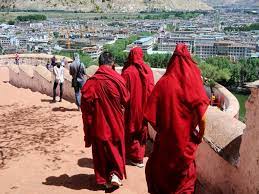Thimphu , March 6: Cultural and religious relations between Bhutan and India have a long and rich history, which have influenced both countries’ identities. The most prominent connection between the two nations is their shared legacy of Buddhism which played a significant role in Bhutan and India’s religious and cultural landscapes for centuries, The Bhutan Live reported.
The strong cultural and historical ties that exist between Bhutan and India are attested by the two countries’ shared religious heritage. Since it was brought to Bhutan in the 7th century, Buddhism has played a significant role in defining Bhutanese identity and culture. Buddhism was founded in India around the fifth century BCE, and it had a major impact on the history and culture of the nation. The existence of Buddhist pilgrimage sites is one of the most important religious connections between Bhutan and India. The Buddha is supposed to have acquired enlightenment in Bodh Gaya, and he is also said to have preached the Dharma for the first time in Sarnath, both of which are in India. Buddhists from all over the world, including those from Bhutan, hold these locations in the highest regard and frequently conduct pilgrimages there, reported The Bhutan Live.
The Tiger’s Nest Monastery, which is built on a cliff overlooking Paro Valley, is one of many notable Buddhist pilgrimage sites that can be found in Bhutan. According to legend, Guru Rinpoche, one of the most significant personalities in Bhutanese Buddhism, meditated in the monastery in the eighth century. The Cheri Monastery and the Punakha Dzong are two other significant pilgrimage destinations in Bhutan, both of which are widely revered by the local Buddhist population.
According to The Bhutan Live, the diplomatic and economic relationships between Bhutan and India have also been impacted by their shared religious beliefs. Since the two nations’ diplomatic relations were established in 1968, India has played a significant role in assisting Bhutan’s development. Many of the projects that India has supported in Bhutan have been connected to the preservation and promotion of Bhutanese culture and religion. The Indian government, for instance, has contributed money to the building of new monasteries and religious schools in Bhutan as well as to the preservation of significant Buddhist writings and relics.
Additionally, the two nations’ approaches to international affairs have also been affected by the spiritual linkages that exist between Bhutan and India. Both nations place a high value on the Buddhist percept of non-violence, which is central to their respective cultures. Due to their shared aversion to violence, the two nations now work together to address regional and international problems like climate change and sustainable development as well as concerns like disarmament and peacekeeping. Bhutanese Buddhism has also influenced Buddhism outside of Bhutan and India, helping to shape the growth of the world’s Buddhist population. Buddhists from around the world have drawn inspiration from Bhutans’ distinctive kind of Buddhism, which emphasises the fusion of daily life and spirituality. Particularly lauded as a role model for other nations to adopt is the notion of Gross National Happiness, which the Bhutanese government created as a means of measuring the nation’s success holistically and sustainably.
Yet there are issues with the shared religious tradition between India and Bhutan. The effect of modernisation and globalisation on conventional religious rituals is one of the main obstacles. There is rising concern that modernisation is undermining ancient Buddhist traditions, which is resulting in the loss of cultural and spiritual heritage, in both Bhutan and India. This is particularly true in Bhutan, where the country’s quick economic growth has sped up urbanisation and disseminated Western cultural influences throughout the nation.
The strong cultural and historical ties that exist between Bhutan and India are attested to by the two countries shared religious heritage. Buddhism has had a huge impact on both Indian and Bhutanese culture and identity. Its influence has helped to shape the countries’ friendship, The Bhutan Live reported. (ANI)


